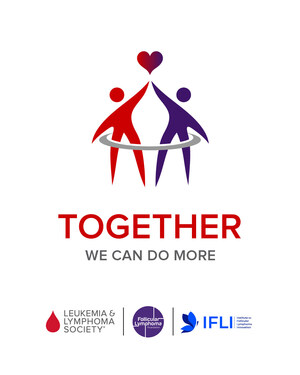LLS Applauds FDA Approval of New Targeted Therapy for Acute Myeloid Leukemia as a Significant Advance for Deadly Blood Cancer
RYE BROOK, N.Y., Aug. 1, 2017 /PRNewswire-USNewswire/ -- Today marks another significant advance in the offensive against acute myeloid leukemia (AML), one of the most deadly blood cancers that takes more than 10,000 lives in the U.S. each year. The Leukemia & Lymphoma Society (LLS) applauds The U.S. Food & Drug Administration's approval today of a new targeted therapy, enasidenib (IDHIFA®), for patients with AML, who have a specific genetic mutation called IDH2.
The approval is for AML patients who have relapsed or do not respond to standard chemotherapy, and have the IDH2 mutation; this genetic marker represents approximately 12 percent of the 21,000 people in the United States diagnosed with AML each year.
Despite progress in treating other blood cancers, there have been few new therapies approved for AML in the past 40 years, with the majority of patients treated with the same two chemotherapeutic agents, which are especially toxic in older adults. The prognosis for AML patients is very poor, especially for patients older than 60, with less than 20 percent of these patients surviving five years after diagnosis.
Recent advances in genomic technology that enable doctors to identify the underlying genetic drivers of an individual patient's disease have opened the door to a more personalized approach to treatment.
After four decades of little progress, today's approval of enasidenib, developed through a partnership between Celgene and Agios, marks the second approval of a targeted therapy for AML patients in just the past three months and the first for patients with the IDH2 mutation. On April 28, the FDA approved Novartis's midostaurin (Rydapt®), in combination with chemotherapy, for a subset of patients with a mutation called FLT3, which constitutes approximately 30 percent of the AML population.
"AML patients desperately need new and better options for treatment. Adding enasidenib and midostaurin to the treatment armamentarium is a very encouraging step for AML patients, and is further proof that we are headed in the right direction with an exciting precision medicine approach to conquering this difficult cancer," said Louis J. DeGennaro, LLS President and CEO. "For too long, we've treated AML as a one-size-fits-all disease and we are changing that."
Last year, LLS launched its own groundbreaking precision medicine study, the Beat AML Master Trial, a significant collaboration in which multiple targeted treatments for newly diagnosed AML patients are being tested simultaneously at multiple cancer centers around the country. Enasidenib is among the investigational drugs being tested in the Beat AML trial, as a
first-line therapy for newly diagnosed AML patients with the IDH2 mutation. In addition to its inclusion in the Beat AML Master Trial, enasidenib continues to be tested in other trials, both as a monotherapy and in combination with standard chemotherapy.
"The Beat AML Master Trial is designed to deliver the right drug to the right patient at the right time," said DeGennaro. "As a patients-first organization, LLS is committed to leading and innovating new approaches to the way cancer research is conducted."
To learn more about enasidenib, click this link.
More Promise for AML Treatment
We're seeing more encouraging advances in treating AML. Since 2009 LLS has supported Celator Pharmaceuticals (acquired last year by Jazz Pharmaceuticals) in its development of CPX-351 (Vyxeos TM), an innovative reformulation of the standard chemotherapies that optimizes the ratio and delivery of the drugs. The therapy outperformed standard care in an LLS-supported Phase 3 clinical trial in older patients with a high-risk subset of the disease. Jazz submitted the therapy to FDA for review in March.
LLS invests more than one quarter of its research budget annually in AML research – more than $100 million over the past five years; beyond the Beat AML Master Trial, LLS is currently supporting approximately 60 preclinical and clinical AML projects.
"LLS invests in research areas in which we know we can make a significant impact," explains DeGennaro. "We recognized early on the urgency in finding new and better treatments for AML. After four decades and millions of dollars invested, we are finally seeing results for AML patients that give us real reason for optimism," DeGennaro said.
About The Leukemia & Lymphoma Society
The Leukemia & Lymphoma Society® (LLS) is the world's largest voluntary health agency dedicated to blood cancer. The LLS mission: Cure leukemia, lymphoma, Hodgkin's disease and myeloma, and improve the quality of life of patients and their families. LLS funds lifesaving blood cancer research around the world, provides free information and support services, and is the voice for all blood cancer patients seeking access to quality, affordable, coordinated care.
Founded in 1949 and headquartered in Rye Brook, NY, LLS has chapters throughout the United States and Canada. To learn more, visit www.LLS.org. Patients should contact the Information Resource Center at (800) 955-4572, Monday through Friday, 9 a.m. to 9 p.m. ET.
Contact:
Andrea Greif
[email protected]
914-821-8958
SOURCE The Leukemia & Lymphoma Society
Related Links
WANT YOUR COMPANY'S NEWS FEATURED ON PRNEWSWIRE.COM?
Newsrooms &
Influencers
Digital Media
Outlets
Journalists
Opted In





Share this article